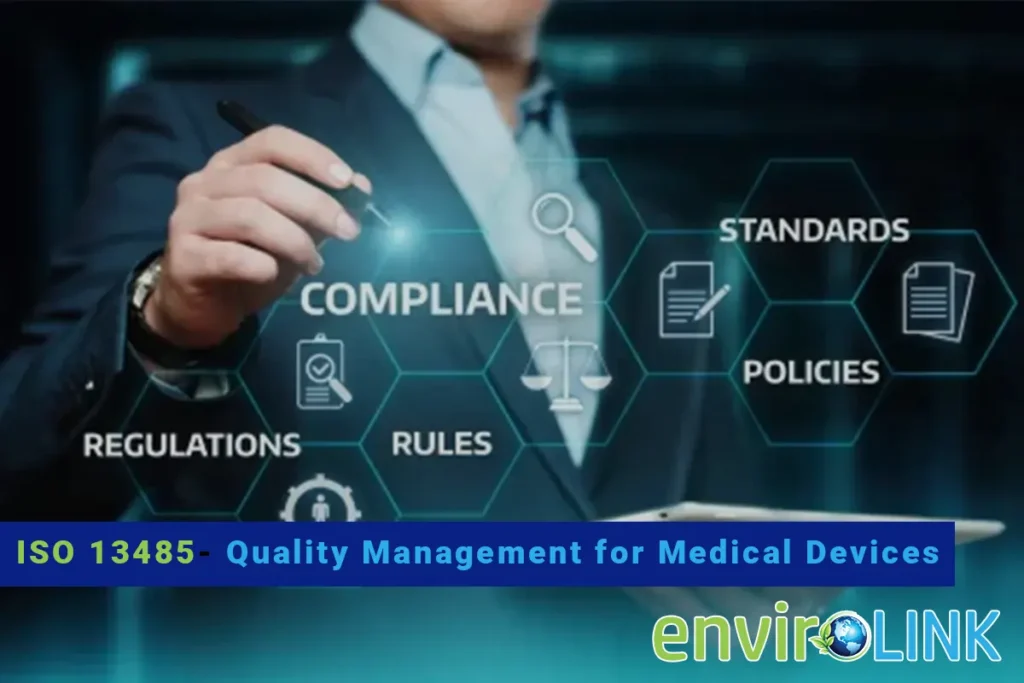ISO 13485
Quality Management for Medical Devices

What is ISO 13485 Certification?
Why ISO 13485 Certification?
Obtaining ISO 13485 Certification is essential for medical device manufacturers and suppliers aiming to establish trust and credibility in the industry.
-
Ensure Compliance
ISO 13485 aligns with regulatory requirements, including those of the Saudi Food and Drug Authority (SFDA), ensuring legal compliance and market access. -
Enhance Product Quality
Implementing ISO 13485 fosters a culture of quality throughout the organization, resulting in improved product reliability and performance. -
Mitigate Risks
The standard emphasizes risk management principles, helping companies identify and address potential hazards associated with medical devices, thereby reducing liability and ensuring patient safety. -
Boost Market Competitiveness
ISO 13485 Certification enhances marketability by demonstrating a commitment to quality, opening doors to new business opportunities and partnerships. -
Streamline Processes
Implementing ISO 13485 streamlines processes, reduces waste, and increases operational efficiency, leading to cost savings and higher profitability.
Benefits of ISO 13485
Market Access
Regulatory Compliance
Aligning with the standard ensures conformity with SFDA regulations, minimizing the risk of non-compliance penalties and product recalls.
Customer Confidence
Global Recognition
Certification to ISO 13485 enhances international competitiveness, enabling Saudi medical device manufacturers to access global markets and expand their reach.
Operational Efficiency
Implementing ISO 13485 improves processes, reduces errors, and enhances resource utilization, leading to increased productivity and profitability.
Yes, ISO 13485 Certification is renewable. Organizations must undergo regular surveillance audits by accredited certification bodies to maintain certification validity. Renewal demonstrates continued compliance with the standard’s requirements and commitment to quality improvement.
ISO 13485 Implementation
ISO 13485 certification Cost in saudi Arabia
The cost of ISO 13485 certification in Saudi Arabia can vary depending on several factors such as the size and complexity of the organization, the scope of certification, and the chosen certification body. Typically, the cost includes expenses related to initial assessment, documentation review, training, implementation support, and certification audit fees.
For companies seeking ISO 13485 certification in Saudi Arabia, it’s advisable to request quotes from multiple certification bodies to compare costs and services offered. While the initial investment may vary, it’s essential to consider the long-term benefits of certification, including improved quality management, regulatory compliance, enhanced market access, and increased customer confidence. Envirolink, as a reputable provider of ISO certification services in Saudi Arabia, offers competitive pricing and comprehensive support to help organizations achieve ISO 13485 certification efficiently and cost-effectively.
ISO 13485 Standard
In Saudi Arabia, ISO 13485 serves as a cornerstone for ensuring the quality and safety of medical devices produced and distributed within the Kingdom. Aligned with global standards, ISO 13485 outlines the requirements for establishing, implementing, and maintaining a quality management system (QMS) specific to the medical device industry.
Adherence to ISO 13485 in Saudi Arabia is essential for medical device manufacturers, importers, and distributors to demonstrate compliance with regulatory requirements and ensure product quality throughout the supply chain. The standard encompasses various aspects, including risk management, regulatory compliance, documentation control, and continuous improvement.
Companies operating in Saudi Arabia can benefit significantly from implementing ISO 13485. It enables organizations to enhance the efficiency of their processes, mitigate risks, improve product quality, and ultimately, enhance customer satisfaction. Additionally, ISO 13485 certification can provide organizations with a competitive edge in the market by demonstrating their commitment to quality and regulatory compliance.
Envirolink, with its expertise in ISO certification services, assists organizations in Saudi Arabia in navigating the complexities of ISO 13485 compliance. Through tailored solutions and comprehensive support, Envirolink empowers companies to achieve and maintain ISO 13485 certification, ensuring compliance with regulatory requirements and fostering continuous improvement in the medical device industry.
In Saudi Arabia, adherence to the ISO 13485 standard is crucial for ensuring the quality and safety of medical devices across the Kingdom. Aligned with global standards, ISO 13485 delineates the requirements for establishing, implementing, and maintaining a quality management system (QMS) tailored specifically to the medical device industry. This standard is instrumental for medical device manufacturers, importers, and distributors, as it demonstrates compliance with regulatory mandates and ensures product quality throughout the supply chain.
Implementing ISO 13485 in Saudi Arabia offers numerous benefits for companies operating in the medical device sector. It enables organizations to enhance process efficiency, mitigate risks, improve product quality, and ultimately, enhance customer satisfaction. ISO 13485 certification not only signifies a commitment to quality and regulatory compliance but also provides a competitive advantage in the market. By demonstrating adherence to internationally recognized standards, companies can instill trust and confidence in their products, leading to increased market acceptance and expanded business opportunities.
Envirolink, with its expertise in ISO certification services, plays a pivotal role in supporting organizations across Saudi Arabia in achieving ISO 13485 compliance. Through tailored solutions and comprehensive support, Envirolink empowers companies to navigate the complexities of certification seamlessly. By partnering with Envirolink, organizations can streamline their certification process, ensuring compliance with regulatory requirements and fostering continuous improvement in the medical device industry.
